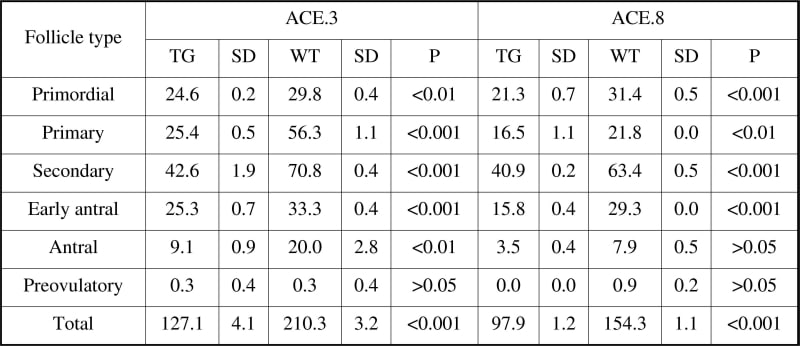The renin-angiotensin system (RAS) has been identified in the ovary of several species. It may be involved in ovarian development, folliculogenesis, steroidogenesis and apoptosis, and may have autocrine/paracrine effects. We studied ovarian follicle numbers in mice with genetic changes to the angiotensin converting enzyme (ACE) gene compared to their wild types (WT). Ovaries were collected from two strains of transgenic (TG; ACE.3 and ACE.8) mice, produced by homologous recombination in ES cells. These express ACE only in the liver and heart, respectively. Controls were WT animals from the 2 TG strains used in this preliminary study. All animals were humanely killed. The TG mice were aged 9 (ACE.3) and 8 (ACE.8) weeks (n=4 for both TG; WT, n=2 for ACE.3 and n=4 for ACE.8). Ovaries were removed, fixed and serially sectioned. Every tenth section was stained using haematoxylin and eosin and the number of each type of follicle from primordial to preovulatory was then counted. Differences between follicle numbers were analysed by ANOVA. There was a statistically significant reduction in the number of follicles, from primordial to early antral for ACE.8 TG and to antral for ACE.3 TG mice (see Table 1). The reduction in follicle numbers seen with both strains of TG ACE mice supports the hypothesis that the RAS is involved in follicle development, particularly the early stages. The reduction in primordial follicles is important as this will influence the number of follicles able to progress to the next stage of development. TG ACE mice will have impaired angiotensin II production, which through its receptors is known to have effects on cell growth, proliferation and regulation. This could explain why the genetically altered mice have fewer follicles progressing to the antral stage. Impairment of the RAS in the ovary could be a factor for infertility/early menopause, due to the reduction in follicle numbers.
- Microvascular & Endothelial and Placental & Perinatal Physiology (Joint Session) C83-C88 PC107-PC120
University of Bristol (2005) J Physiol 567P, PC120
Poster Communications: Transgenic ACE mice have reduced ovarian follicle numbers
Pountain, S J; Fuchs, S; Xiao, H D; Bernstein, K; Broughton Pipkin, F; Hunter, M G;
1. Division of Animal Physiology, University of Nottingham, Leics, United Kingdom. 2. Pathology, Emory University, Atlanta, GA, USA. 3. Obstetrics and Gynaecology, Univeristy of Nottingham, Nottingham, United Kingdom.
View other abstracts by:
Table 1. Ovarian follicle numbers in TG and WT mice
Where applicable, experiments conform with Society ethical requirements.

